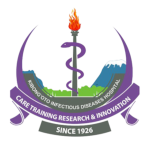
THE UNITED REPUBLIC OF TANZANIA
MINISTRY OF HEALTH
KIBONG'OTO INFECTIOUS DISEASES HOSPITAL



This open-access article published in IJTLD Chronic Respiratory Disease highlights the growing global burden of post-tuberculosis lung disease (PTLD)—a significant cause of chronic respiratory disability among individuals previously treated for pulmonary tuberculosis. Drawing on clinical data and epidemiological findings, the paper examines how residual lung damage after TB treatment contributes to long-term morbidity including persistent cough, airflow limitation, radiographic abnormalities, and reduced quality of life. The authors discuss major risk factors associated with PTLD, underscore its high prevalence in low- and middle-income countries (LMICs), and call for integrated care approaches that extend beyond microbiological cure to address chronic respiratory sequelae. Importantly, the article frames PTLD within the broader spectrum of chronic respiratory diseases (CRDs) and advocates for enhanced surveillance, pulmonary rehabilitation, and health systems responses to mitigate the long-term impact of TB on lung health.
Published at Feb. 24, 2026, 5:48 p.m.
This paper presents an innovative health systems approach developed and implemented in Tanzania to integrate the management of communicable and non-communicable diseases (NCDs), specifically tuberculosis (TB) and diabetes mellitus (DM). Recognizing that TB and diabetes often co-exist and interact to worsen patient outcomes, the study sought to design and test models that make healthcare delivery more patient-centered, efficient, and sustainable
Published at Oct. 29, 2025, 10:52 a.m.
This cross-sectional study in Tanzania (Korogwe District, 2018–2019) used metagenomic next-generation sequencing (mNGS) to characterize microbes and antimicrobial resistance (AMR) genes in children with acute febrile illness (AFI). Blood samples from 25 children (mean age 11.6 years) were analyzed. Five potential microbial causes of AFI were identified: Escherichia coli (n=19), Paraclostridium bifermentans (n=2), Pegivirus C (n=2), Shigella flexneri (n=1), and Pseudomonas fluorescens (n=1). E. coli was the most prevalent and harbored most of the 12 detected AMR genes (including mdtC, acrF, mdtF, emrB). mNGS proved valuable for pathogen and AMR profiling in outbreak settings.
Published at Aug. 26, 2025, 5:50 a.m.
